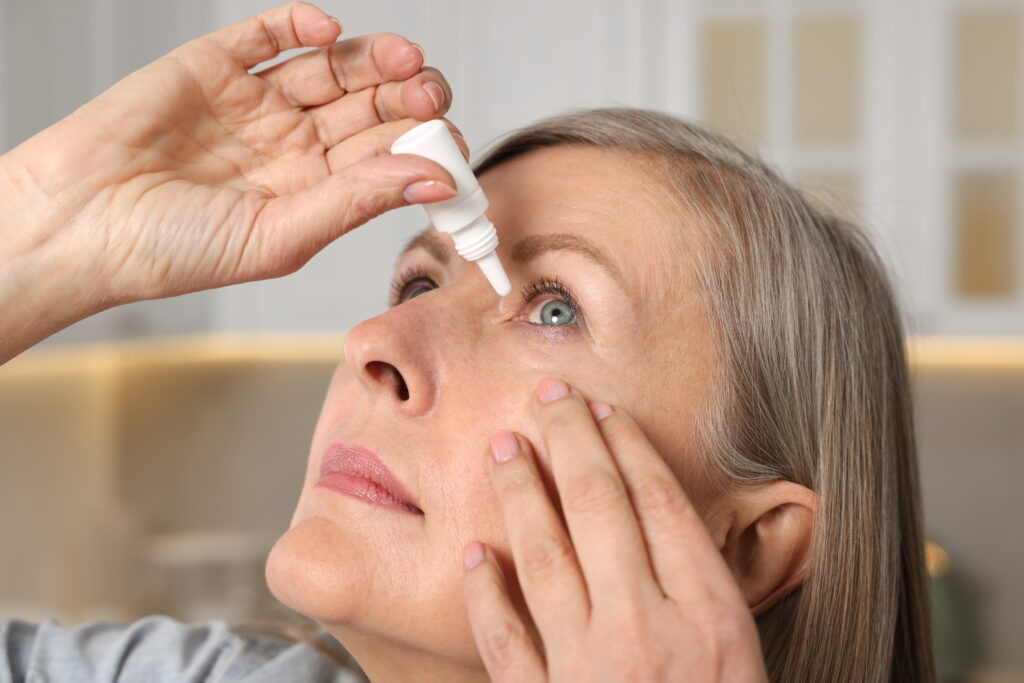
Eye drops are an essential part of the recovery after cataract surgery. They help to prevent post-operative infection, control inflammation, and promote the body’s natural healing process.
During cataract surgery, your eye doctor will remove the natural lens of the eye that has been clouded by cataracts. The natural lens is then replaced with an artificial intraocular lens (IOL), which restores clear vision and prevents cataracts from returning.
While cataract surgery is minimally invasive, it can put your eyes at risk for post-surgery complications, such as infection and inflammation. These complications can threaten the health of your eyes and the outcome of cataract surgery.
What Eye Drops Are Prescribed After Cataract Surgery?
Typically, three types of eye drops are prescribed after cataract surgery: an antibiotic, a steroid, and a non-steroidal anti-inflammatory (NSAID). Antibiotic eye drops prevent bacterial infection; steroid eye drops reduce inflammation that can affect healing, and NSAID eye drops reduce inflammation and also provide pain relief.
These three types of eye drops are usually prescribed individually, which can cause confusion about dosage and schedule. At Fichte, Endl, & Elmer, we proudly offer our cataract patients an innovative alternative to multiple eye drops: OxRX.
What is OxRX?
OxRX is a unique eyedrop that combines all the prescribed eye drops a cataract patient needs into a single bottle. It is created in the OxRX’s own compounding pharmacy to ensure patients get the proper medications in one convenient drop.
The OxRX approach offers several significant benefits that can improve post-operative care, including:
- Easier Recovery Care: With all the medications a patient needs in one bottle, there’s less worry about mixing them up or taking the wrong dose.
- Fewer Daily Drops: Because OxRX combines required medications into a single formula, patients need fewer applications for the same amount of care.
- Money Savings: With OxRX, patients pay a one-time cost or co-pay versus multiple payments for each separate eye drop.
- Convenient Home Delivery: The OxRX compounding pharmacy delivers a patient’s medication right to their home or eye doctor’s office exactly when they need it, with no delivery charges.
For all these benefits and more, we think OxRX is the best option for post-operative eye drops for our cataract patients. It can help patients have a smoother and less stressful recovery after cataract surgery.
Frequently Asked Questions About Eye Drops After Cataract Surgery
Many patients have questions about using prescribed eye drops after cataract surgery. Here are the answers to some of the most frequently asked questions:
Q: How often do I need to use eye drops after cataract surgery and when can I stop using them?
A: The answer to that question depends on the type of eye drop, the progress of your recovery, and the instructions of your eye surgeon or eye doctor. Some people need to use eye drops for only a few weeks, while others may need to continue using them longer.
Q: What happens if I miss a dose of my post-operative eye drops?
A: If you miss a dose, you should apply it as soon as you remember, unless it’s almost time for your next dose. If you are concerned about a missed dose or have other questions about your recovery progress, you should contact your eye surgeon or eye doctor.
Q: Can I use artificial tears or lubricating eye drops with my prescription eye drops?
A: It is usually fine to use artificial tears or lubricating eye drops for dry eye relief while taking your prescription eye drops, but you should not use them at the same time. You should wait at least 10 minutes after using your prescription eye drops before using eye drops for dry eye.
Once the clarity of your vision has been restored with cataract surgery, it’s important to closely follow your post-operative care plan to ensure a healthy recovery. Taking prescribed eye drops as a part of that plan protects the health of your eyes and the quality of your eyesight.
Do you want to learn more about cataract surgery? Attend one of our upcoming Cataract Surgery Lunch + Learn programs. To learn more or reserve your seat(s), click this link or call 800-309-2020.



